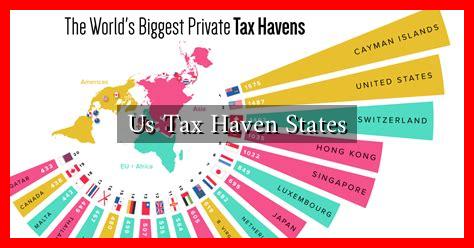-
Table of Contents
Understanding US Tax Haven States
Tax havens are jurisdictions that offer favorable tax conditions to individuals and businesses, often attracting wealth and investment.
. While many people associate tax havens with offshore locations, several states within the United States also provide tax advantages that can be appealing to both individuals and corporations. This article explores the concept of US tax haven states, their characteristics, and the implications for taxpayers and the economy.
What Defines a Tax Haven?
A tax haven is typically characterized by low or no taxes, financial secrecy, and minimal regulatory oversight. In the context of US states, tax havens often feature:
- Low or zero state income tax
- Favorable corporate tax rates
- Privacy laws that protect financial information
- Minimal reporting requirements for businesses
These features make certain states attractive for individuals and corporations looking to minimize their tax liabilities.
Key US Tax Haven States
Several states in the US are recognized as tax havens due to their favorable tax policies. Here are some of the most notable:
1. Delaware
Delaware is perhaps the most famous tax haven in the United States. It has no state sales tax and offers a very low corporate income tax rate of 8.7%. Additionally, Delaware allows for the formation of LLCs and corporations with minimal disclosure requirements, making it a popular choice for businesses seeking privacy.
2. Nevada
Nevada is another state that attracts businesses due to its lack of state income tax and corporate tax. The state also has strong privacy protections for business owners, which further enhances its appeal. Nevada’s business-friendly environment has led to a significant increase in the number of corporations registered there.
3. Wyoming
Wyoming offers no state income tax and low corporate taxes, making it an attractive option for both individuals and businesses. The state also has a reputation for strong asset protection laws, which can be beneficial for those looking to shield their wealth from creditors.
4. South Dakota
South Dakota has gained recognition as a tax haven due to its lack of state income tax and favorable trust laws. The state allows for the establishment of trusts with minimal taxation, making it a popular choice for wealthy individuals looking to manage their estates.
Implications of US Tax Havens
While tax havens can provide significant benefits to individuals and corporations, they also raise important questions about fairness and economic impact. Here are some implications to consider:
- Revenue Loss: States with tax haven characteristics may contribute to revenue loss for other states, as businesses and wealthy individuals relocate to take advantage of lower taxes.
- Economic Disparities: The concentration of wealth in tax haven states can exacerbate economic disparities, as resources are diverted from states that rely on higher tax revenues.
- Regulatory Scrutiny: The use of tax havens has drawn increased scrutiny from regulators and lawmakers, leading to calls for reform and greater transparency in corporate taxation.
Case Studies: The Impact of Tax Havens
Several high-profile companies have utilized US tax havens to minimize their tax liabilities. For example, companies like Amazon and Google have been known to structure their operations in ways that take advantage of favorable tax laws in states like Delaware and Nevada. This has sparked debates about corporate responsibility and the ethics of tax avoidance.
According to a report by the Institute on Taxation and Economic Policy, large corporations in the US collectively avoided an estimated $60 billion in federal taxes in 2020 by using various tax strategies, including those available in tax haven states.
Conclusion
US tax haven states like Delaware, Nevada, Wyoming, and South Dakota offer significant tax advantages that attract individuals and businesses alike. While these states provide opportunities for tax savings, they also contribute to broader economic challenges, including revenue loss for other states and increased scrutiny from regulators. As the conversation around tax fairness continues, it is essential for policymakers to consider the implications of tax havens and explore potential reforms to ensure a more equitable tax system.
For more information on tax havens and their impact, you can visit the Institute on Taxation and Economic Policy.





